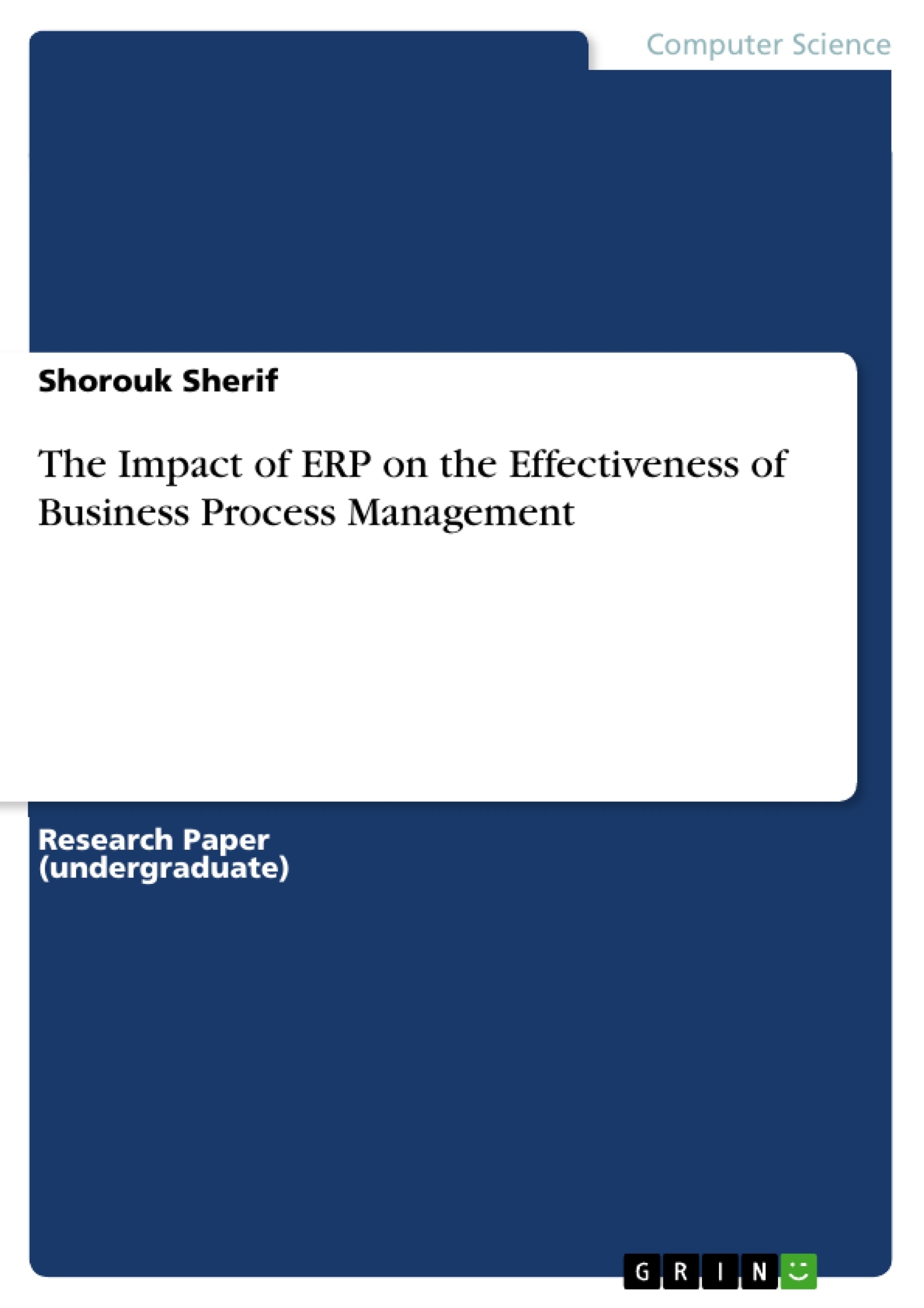Enterprise Resource Planning (ERP) is a software that consists of a group of applications and tools that aim mainly to monitor business functions, operations and processes across an organization, providing reliable information to different units of the company such as finance and accounting, sales and distribution, human resources and others. In addition, with the daily evolution of information technology, the ERP system has been progressing and building itself for the last two decades, until it took the shape we all know now.
On the other hand, Business Process Management (BPM) can be identified as the discipline that reaches for the maximum control and management of organizational structure and format of the business processes, which eventually leads to enhanced business process management.
This research paper is exploring the impact of ERP on the effectiveness of business process management by evaluating ERP potential development on business processes and how automation provided by ERP would affect these processes. In addition, this study aims to demonstrate the functionalities of ERP, and their possible positive effect the system may have on business performance, even though some studies argue that not all ERP implementation project succeed.
The paper is organized as follows: the first section will discuss ERP's definition, evolution and history, functionalities, the implementation stages of ERP systems, benefits of ERP and the cloud ERP and its types. The second section will discuss the definition of business processes management. In addition, the BPM methodologies including business process architecture, how to make the right choice for methodology and process classification framework. The last section will discuss and explore how investing in ERP can improve BPM by explaining the budget, time and plan needed for ERP systems and business processes re-engineering and system integration to match with the ERP systems. Also this section includes benefits and risks of ERP on BPM by evaluating ERP effectiveness and efficiency and assessing risks.
Table of Contents
- Introduction
- Literature Review
- Enterprise Resource Planning (ERP)
- ERP Definition
- ERP Evolution and History
- ERP functionalities
- ERP Implementation
- Implementation Strategies
- Implementation Procedure
- Implementation Challenges
- ERP Benefits
- ERP Model
- Cloud ERP
- Definition and Function
- Cloud ERP Types
- Cloud ERP
- Business Process Management (BPM)
- BPM Definition
- BPM Methodologies
- Construction of Business Process Architecture
- Choosing the best methodology and the ten principles
- The BPM map
- Processes, activities and tasks
- The Process Classification Framework
- BPM Assessment
- Maturity Assessment
- Life Cycle Assessment
- The Impact of ERP on BPM
- Investing in ERP for BPM Improvement
- ERP Implementation
- Business processes re-engineering and system integration
- Benefits and risks of ERP on BPM
- ERP effectiveness and efficiency
- Assessing risks
- Investing in ERP for BPM Improvement
- Research Gap
- Methodology
- Method and Description
- Instrument
- Sampling
- Procedures
- References
- Appendix
Objectives and Key Themes
This research paper examines the impact of Enterprise Resource Planning (ERP) on the effectiveness of business process management. It explores the potential development of ERP on business processes and how automation provided by ERP affects these processes. The study aims to demonstrate the functionalities of ERP and its potential positive effect on business performance, while acknowledging that not all ERP implementation projects succeed.
- The impact of ERP on business processes and process automation
- The effectiveness of ERP implementation and its influence on business performance
- The benefits and risks associated with ERP implementation for business process management
- The role of cloud-based ERP systems in improving business processes
- The importance of business process re-engineering and system integration in successful ERP implementation
Chapter Summaries
The first chapter introduces the concept of Enterprise Resource Planning (ERP) and its evolution, outlining its functionalities and implementation stages. It also highlights the benefits of ERP systems and explores the types of cloud-based ERP solutions. The second chapter delves into the definition and methodologies of Business Process Management (BPM), including the construction of business process architecture and process classification frameworks. The third chapter investigates the impact of ERP on BPM, discussing how investing in ERP can improve business processes through re-engineering and system integration, and analyzing the benefits and risks of ERP implementation.
Keywords
This research paper focuses on the relationship between Enterprise Resource Planning (ERP) and Business Process Management (BPM). Key topics include ERP implementation, process automation, business process re-engineering, system integration, ERP benefits and risks, cloud-based ERP solutions, and the impact of ERP on business performance.
- Enterprise Resource Planning (ERP)
- Quote paper
- Shorouk Sherif (Author), 2018, The Impact of ERP on the Effectiveness of Business Process Management, Munich, GRIN Verlag, https://www.grin.com/document/456255



